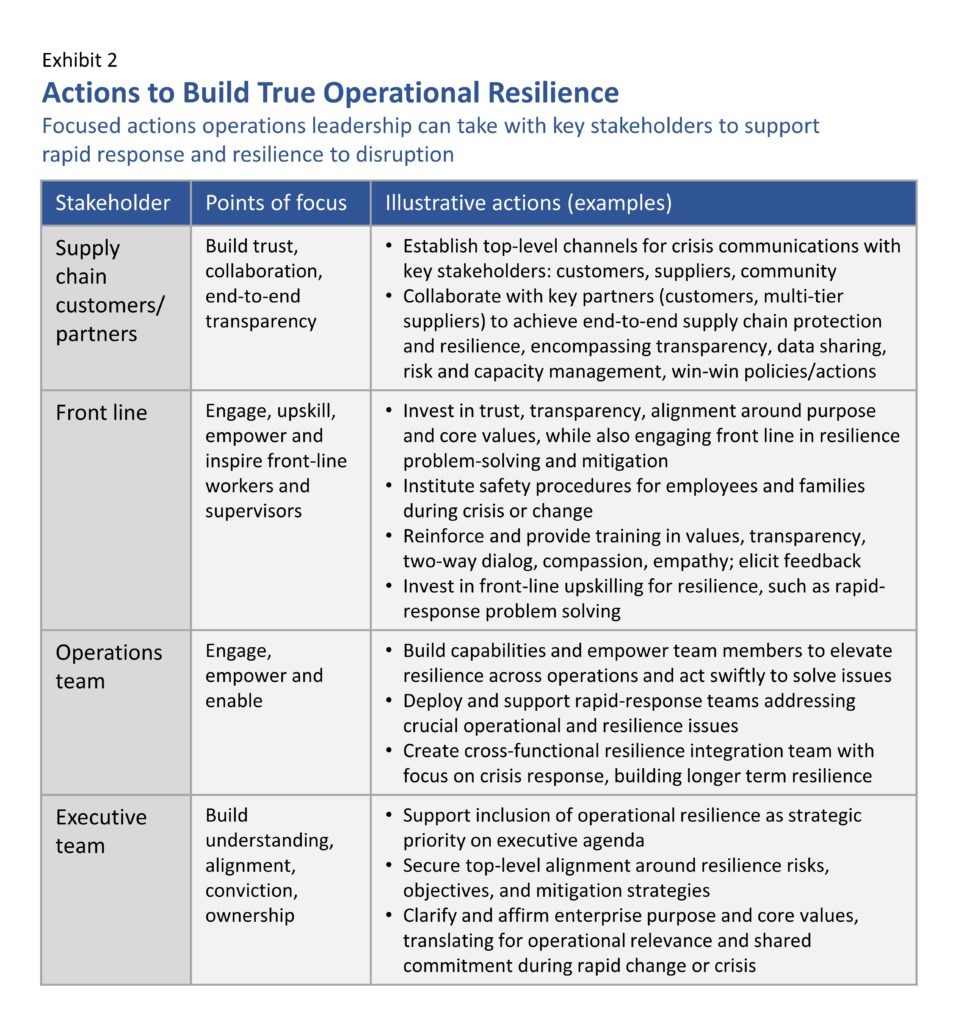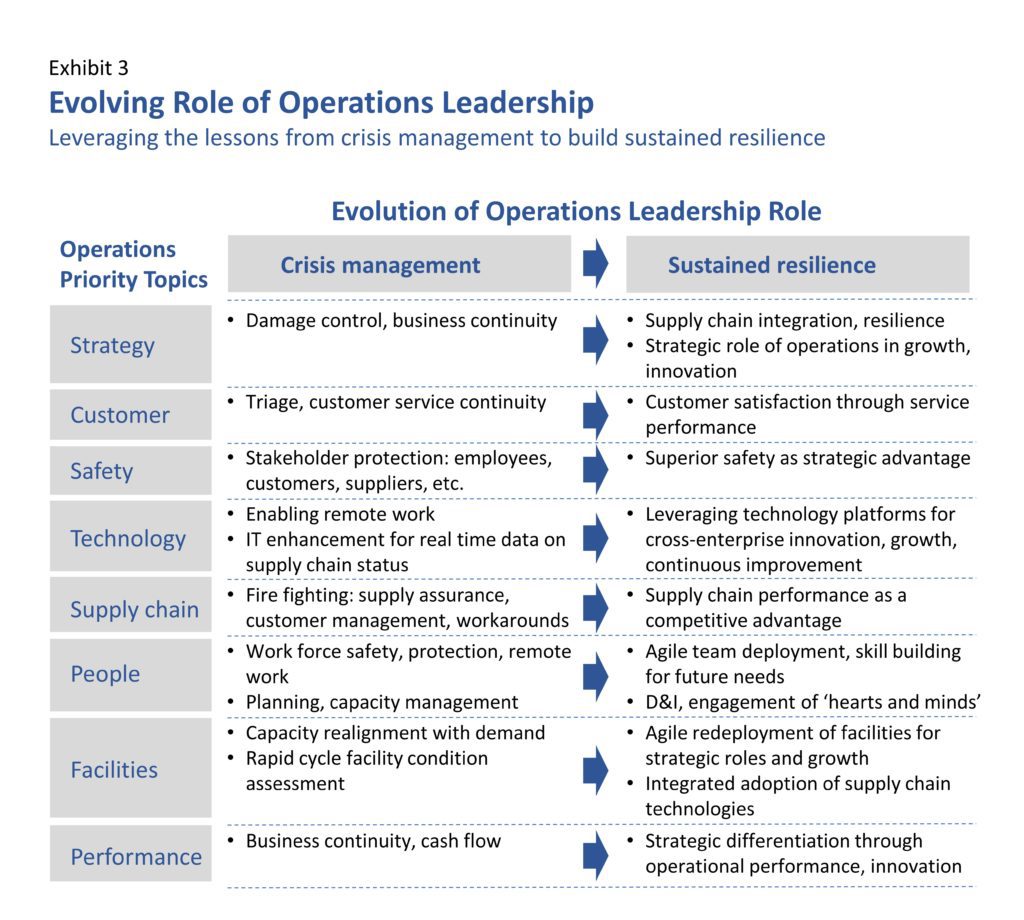The Evolving Role Of Operations Leadership: High Stakes, High Trust, High Impact


 The worldwide spread of Covid-19 presented significant challenges to operations leaders in multiple industry sectors and regions around the world. Unprecedented disruptions in demand and supply, prolonged uncertainty and fragility of supply chain partners combined to require rapid response and sometimes heroic actions to maintain business continuity and protect employees.
The worldwide spread of Covid-19 presented significant challenges to operations leaders in multiple industry sectors and regions around the world. Unprecedented disruptions in demand and supply, prolonged uncertainty and fragility of supply chain partners combined to require rapid response and sometimes heroic actions to maintain business continuity and protect employees.
While it’s tempting to imagine we’ll reach a calmer future at some point, operations leaders have been telling us that the pandemic is only a dress rehearsal for the volatility and uncertainty to come in an increasingly VUCA (Volatile, Uncertain, Complex, Ambiguous) world. Among potential drivers they cite future pandemics, energy transition, climate change, cyber risk, automation and AI, continuing disruptions in global trade, and worsening labor shortages. The only certainty is that the dramatic shutdowns, demand spikes, and shortages we saw through the past year will likely recur.
Operations is the central hub for addressing supply/demand disruptions and uncertainty, so operations leaders are well placed to lead the organization’s response by driving collaboration and problem-solving across the supply chain. In many cases this requires a fundamental reframing of the role of operations leaders, both in their own minds, and in the perception of their executive peers and partners.
Our ongoing conversations with operations leaders over the past year offer insights into how their roles changed during the pandemic and how their organizations successfully responded to the unprecedented challenges they faced. Their experiences offer enduring lessons about the need for:
• Readiness and capability to navigate cycles of adaptation and recovery
• Coordinated actions to build true operational resilience
• Reframing the strategic role and development of operations leaders
Although the nature of challenges presented by Covid-19 varied across companies and industries, the common experience of operations leaders has been a series of rapid and significant disruptions in both supply and demand, combined with high levels of uncertainty about what could change next and where new constraints might arise.
As leaders described their journey of adaptation and recovery, a pattern emerged encompassing distinct phases (Exhibit 1 below):
• Stabilization. Operational disruption inevitably requires re-stabilization; our group of operations leaders described the need to rapidly assess the changing state, take corrective action and implement damage control where urgent issues arise, while establishing processes for mitigation and ‘putting out fires’.
• Rebalancing and recovery. After the initial shock and corrective actions, leaders refocused on restoring business as quickly as possible; this requires ongoing, intensified engagement with employees, customers, suppliers and other stakeholders in order to restore business and operations as much as possible in the newly evolving circumstances.
• Accelerating adaptation and recovery. In this phase, leaders describe a high-engagement process of taking stock of the new context, harnessing lessons learned to execute rapid cycle problem-solving and continuous improvement, and institutionalizing the best practices that emerged from the prior two phases.
• Fortifying capability to meet future disruption …and repeat the cycle. A recurring observation from operations leaders is that “we could have been better prepared”. Based on increased awareness of the likelihood of future disruptions and the dire consequences of unpreparedness, leaders are embracing the imperative of enhanced resilience going forward. This includes enhancing preparedness to navigate the cycle of adaptation and recovery with discipline and intent when future need arises.
 Actions to Build True Operational Resilience
Actions to Build True Operational ResilienceWhile we heard many success stories, operations leaders also told us that in certain cases their CEOs, executive peers, or organizations were not fully equipped to execute the rapid-fire collaboration across organizational boundaries necessary for crisis recovery and ongoing resilience.
As a result, these leaders expressed an intense sense of urgency for their organizations to prepare now to meet the next challenge. In each case, the operations leader leveraged their pivotal position ‘at the hub of the crisis response’ to seek alignment and build trust among critical stakeholders around crisis planning, mitigation and rapid adaptation.
Exhibit 2 (below) outlines focused actions operations leaders can take in collaboration with key stakeholders to establish the mindset, practices and relationships required to respond more rapidly when crisis strikes next, as illustrated in the following examples:
• Supply chain customers/partners. Maintaining reliable supply to customers (and from suppliers) in the face of supply/demand disruptions and uncertainty was a primary challenge for all operations leaders in our working group. Relatedly, these leaders identified end-to-end supply chain resilience as one of their most important priorities in sustaining operations. Critical success factors included establishing mutual trust, data sharing, and supply chain transparency with customers and across multi-tiered supply networks. While technology is an important enabler, trust-based collaboration also proved to be a vital prerequisite for resilience of the supply system.
In the depths of uncertainty during early stages of the Covid-19 crisis, a world leading equipment rental company conducted regular problem-solving working sessions with customers, leading to adjustment in operating procedures that not only addressed logistical supply problems, but in some cases also reduced cost. A global medical technology company augmented its existing supplier development processes with collaborative working sessions including deep analysis of supply risks. This enabled segmentation of suppliers according to Covid-19 impact and criticality to the company, leading to a range of creative solutions such as pre-paying invoices to suppliers facing temporary cash flow strains.
• Front line. Without exception, the operations leaders in our working group declared their front-line workers and supervisors a ‘vital link’ in all phases of the cycle of crisis recovery, and in laying the foundation for operational resilience. In each case, these leaders described substantial efforts both to ensure employee safety, and to invest in building transparency and trust through open and honest dialog. At the same time, the leaders lamented the difficulty of maintaining the quality of personal connection with the front line that was possible prior to Covid-19 safety protocols.
Front-line employees of a global pharmaceutical developer and manufacturer with facilities in India faced inadequate access to medical care as the Covid-19 crisis spread. The company set up internal medical clinics, recognizing the extraordinary sacrifices these employees were making to keep production running, and because it was “the right thing to do”. The operations leader of a worldwide distributor of healthcare products and services described how sales leadership made videos congratulating and thanking the front-line for their heroic efforts to support customers. The videos were played for front-line workers in all distribution and manufacturing facilities to recognize their extraordinary efforts.
• Operations team. Building alignment and capabilities within the operations team is vital to enable team members to take leadership roles required to resolve operational issues quickly and to lay the foundation for increased resilience.
The operations team of a leading global cold chain logistics company found that prior investments in lean culture and standard work procedures enabled the team leverage existing skills and processes to act quickly during the Covid-19 crisis, leading cross-functional problem solving and experimenting with rapid response experimental fixes rather than incurring delays in pursuit of perfect answers.
• Executive team. Executive team understanding, alignment, conviction and ownership of resilience as a strategic priority is essential, enabling the right ‘tone at the top’ and appropriate allocation and sometimes rapid reallocation of resources.
The executive team of a major natural gas and electricity utility had learned from previous weather-related crises that their own hands-on leadership, in close collaboration with operations leaders, would be essential throughout the Covid-19 crisis. Additionally, they had already invested in back-up optionality, contingencies and supply-chain protections based on their appreciation of the value of operational resilience and their dedication to maintaining consistent supply to customers.
 Humanity, authenticity and trust as foundational leadership attributes
Humanity, authenticity and trust as foundational leadership attributesAn underlying pattern of success emerged in these interactions between operations leaders and their stakeholders—the establishment of a solid foundation of humanity, authenticity and trust. We heard from these leaders that crisis and uncertainty provided a test of the authenticity and humanity of leadership. Leaders who communicated transparently, and provided hope anchored in reality, earned the trust of their colleagues and stakeholders, especially including the front line, helping to drive alignment.
In particular, operations leaders who invested deeply in trust with the front-line prior to the Covid-19 crisis were able to draw on the store of accumulated goodwill when the crisis struck. For example, the operations leader of a worldwide distributor of healthcare products and services described how frequent, intensive communications and front-line employee engagement processes established prior to the crisis provided a ‘bank of trust and goodwill’ that kept front-line workers reporting for work during the most challenging times. This focus on maintaining a trust-based foundation underpinned leadership’s efforts to maintain transparency, reinforce values and secure effective engagement with the front line under rapidly changing circumstances during the crisis.
These leaders additionally recognized trust as a two-way street. Leaders who not only earned trust, but also entrusted and empowered their organization and the front line, were able to unleash the full power of their organizations to achieve extraordinary results more effectively and quickly than would otherwise be possible, despite adverse circumstances.
Across many companies and industries, operations leaders have functional responsibility for the vast majority of assets and employees within their companies. The Covid-19 crisis has served as a catalyst, underscoring the critical role these leaders can and must play, not just in guiding their organizations through crisis recovery, but also in preparing their enterprises for resilience, growth and success in a VUCA environment.
For example, the operations leader for a leading manufacturer of flexible packaging observed that shortcomings in supply chain resilience experienced during the Covid-19 crisis arose from lack of resilience in sourcing strategies and lack of multi-tier transparency that could have been addressed years prior to the pandemic.
In almost every case, the operations leaders in our working group were called upon to take on more prominent roles in decisions and actions affecting the direction and future of their companies than they had prior to the crisis. Re-stabilizing supply chain operations, while also maintaining safety, productivity, and quality of outcomes, required extraordinary leadership, including an ability to align stakeholders within and outside the leader’s own company. By engaging the human capacity of their whole organization and earning trust and transparency in supply chain relationships, these leaders were able to preserve and enhance the performance of their organizations during extraordinary times. Exhibit 3 summarizes the transforming role of operations leaders as they transition from crisis management to managing for sustained resilience beyond the crisis.
 In total, the Covid-19 crisis has offered critical lessons about the roles of operations and operations leadership that will remain applicable after the crisis subsides. There is an opportunity for companies to harness these lessons, reframe prior assumptions about the role of operations, and emerge from the present crisis better equipped to win in future VUCA conditions.
In total, the Covid-19 crisis has offered critical lessons about the roles of operations and operations leadership that will remain applicable after the crisis subsides. There is an opportunity for companies to harness these lessons, reframe prior assumptions about the role of operations, and emerge from the present crisis better equipped to win in future VUCA conditions.
These questions highlight essential factors that enabled our working group of operations leaders to play a high-impact role in building sustained operational resilience across their enterprise:
2. Does operations leadership have a prominent role in strategy formulation and in orchestrating cross-functional initiatives integral to enabling resilience and responsiveness for customers and other stakeholders?
3. Are we cultivating and enhancing trust-based relationships and operational collaboration with customers, suppliers and other stakeholders across the end-to-end supply chain since coordination is critically important in a VUCA world?
4. Are we developing leaders across the enterprise, including in operations and front-line supervision, who understand and embrace humanity, authenticity and trust as leadership principles, as these are critical to establishing ongoing enterprise resilience?
5. Have we established organizational processes and capabilities to deploy and empower rapid-response teams when critical operations issues arise?
6. Are we developing and continuously improving digital capabilities and processes to build superior, multi-tier supply chain transparency and flexibility to support performance under VUCA conditions?
7. Are we effectively utilizing multi-media communications capabilities to support honest dialog up, down and across the organization, including early alerts about operational issues and ongoing dialog to reinforce clarity of purpose and shared values at all levels?
The Covid crisis demonstrates a clear imperative for reframing the role and strategic contribution of operations and operations leaders. By designating operational resilience as a strategic priority and by providing enlightened operations leaders with a true voice at the executive table, companies can energize their entire organization, unleash human potential, and elevate operations as a vital source of resilience, positive impact and strategic advantage. The stakes are high, and such reframing is essential for operations leaders to build stakeholder trust and alignment and to lead effectively in a an increasingly VUCA world.
Over a 14-month period from April 2020 to June 2021, the authors hosted a group of operations leaders and operations executives in a series of interviews, discussions and problem-solving sessions to discuss what had worked, what had not, and what they could do further to meet the challenges of the Covid-19 crisis.
These sessions occurred as the participants were grappling in real time with crisis conditions and the need for urgent transformation. Ground rules for the discussions enabled candid sharing of success, failures and lessons learned. Topics addressed included how to plan for an uncertain future, what strategies and tactics have been effective, and what lessons may have been learned that carry forward beyond the crisis.
This paper synthesizes learnings from the operations leaders’ experiences. These learnings offer profound implications about the evolving role of the operations leader, the power of an enlightened approach to operations leadership in creating operational resilience, and the crucial role of operations as a source of competitive advantage in a volatile, uncertain world.
Chief Executive Group exists to improve the performance of U.S. CEOs, senior executives and public-company directors, helping you grow your companies, build your communities and strengthen society. Learn more at chiefexecutivegroup.com.
0

1:00 - 5:00 pm
Over 70% of Executives Surveyed Agree: Many Strategic Planning Efforts Lack Systematic Approach Tips for Enhancing Your Strategic Planning Process
Executives expressed frustration with their current strategic planning process. Issues include:
Steve Rutan and Denise Harrison have put together an afternoon workshop that will provide the tools you need to address these concerns. They have worked with hundreds of executives to develop a systematic approach that will enable your team to make better decisions during strategic planning. Steve and Denise will walk you through exercises for prioritizing your lists and steps that will reset and reinvigorate your process. This will be a hands-on workshop that will enable you to think about your business as you use the tools that are being presented. If you are ready for a Strategic Planning tune-up, select this workshop in your registration form. The additional fee of $695 will be added to your total.

2:00 - 5:00 pm
Female leaders face the same issues all leaders do, but they often face additional challenges too. In this peer session, we will facilitate a discussion of best practices and how to overcome common barriers to help women leaders be more effective within and outside their organizations.
Limited space available.

10:30 - 5:00 pm
General’s Retreat at Hermitage Golf Course
Sponsored by UBS
General’s Retreat, built in 1986 with architect Gary Roger Baird, has been voted the “Best Golf Course in Nashville” and is a “must play” when visiting the Nashville, Tennessee area. With the beautiful setting along the Cumberland River, golfers of all capabilities will thoroughly enjoy the golf, scenery and hospitality.
The golf outing fee includes transportation to and from the hotel, greens/cart fees, use of practice facilities, and boxed lunch. The bus will leave the hotel at 10:30 am for a noon shotgun start and return to the hotel after the cocktail reception following the completion of the round.